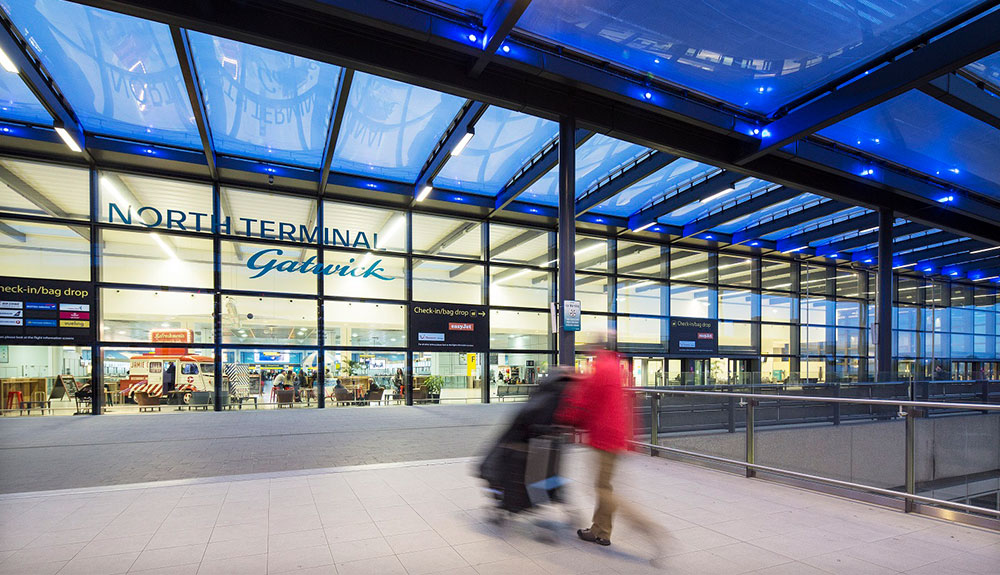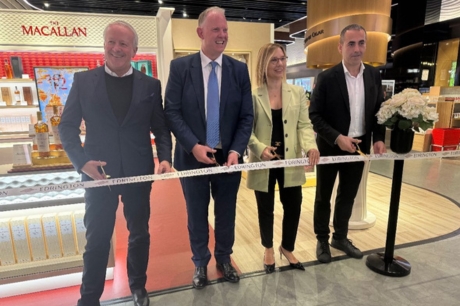Arrivals duty free campaign shoots up political ladder with Parliament debate

All Party Parliamentary Group for The Future of Aviation Chairman, MP Henry Smith.
All-Party Parliamentary Group (APPG) for The Future of Aviation Chairman MP Henry Smith made an impassioned plea in the UK House of Commons this week to introduce duty free on arrival at British airports, international railways and ports.
Smith has been a powerful advocate of arrivals duty free, especially given his constituency of Crawley includes London Gatwick Airport.
The MP outlined at a House of Commons Debate on 6 September that in his view, the introduction of such a regime would be “at worst” cost-neutral to the UK’s HM Treasury.
The MP went further and maintained that increases in corporation and income tax would result in an additional £50 million each year to the Exchequer.
Citing increased spend by UK passengers on duty free overseas, Smith insisted the introduction of arrivals duty free would “repatriate” this, ensuring British businesses are the main beneficiary of the post-Brexit duty free system.
He said: “We know travel hubs need non-aeronautical revenue such as retail and duty free – all UK airports and terminals would benefit from duty free on arrivals stores. The creation of new retail areas at UK airports would trigger capital expenditure with building works as infrastructure is adapted.
“Increased sales can be reinvested into new routes, attracting more visitors making London and regional hubs across this country more competitive with rival cities such as Paris, Milan or Barcelona.”
More than 60 countries have implemented arrivals duty free
Smith highlighted non-EU member Norway, which introduced arrivals duty free in 2005 and promptly ploughed investment into route development and attracted new carriers by lowering charges. “More passenger growth, more income and more investment without the need for government to fund support,” he noted.
More than 60 countries have implemented arrivals duty free, including the major travel hubs of Asia, the Middle East and Oceania as well as fellow non-EU countries.
Smith fired a warning shot across the government’s bows, saying if the EU implements arrivals duty free before the UK, it would have a “very detrimental impact” on British ports of arrival.
He cited modelling conducted by the European Travel Retail Federation (ETRC), predicting GVA boosts for Spain of €300m (£257m), for Italy (€190m) and for France (€580m).
“Such sales would have a devastating impact on British port departure stores,” said Smith, adding: “However, the UK government can get ahead, legislate for arrivals duty free and futureproof the sector.
“The lack of arrivals duty free is placing us at a competitive disadvantage. Polling conducted at several UK airports last year found in many areas, including my own at London Gatwick, two-thirds of people would support government introducing such stores.”

Polling at airports such as Gatwick showed two-thirds of respondents would support arrivals duty free. Source: Gatwick Airport.
The MP said he was “keen to address” Treasury concerns surrounding such a move and highlighted a York Aviation report forecasting arrival duty free stores would result in additional sales of £100m per year and increased passenger spend of between 20% and 30%.
He said: “The additional loss of excise duties to the Treasury is quickly offset by other forms of taxation in addition to new jobs. Even at the lowest levels of predicted sales, the impact on government revenue is still only likely to be cost-neutral at worst and the policy would increase sales on duty paid categories as well.”
Smith addressed concerns on any impact to the high street, noting the only competition to arrivals DF stores is in fact, overseas.
“Introduction of the policy has the support of many brands that sell both on the high street and in the travel retail channels,” he said, adding: “The size of the inbound duty free market is less than 2.2% of the domestic market for the same product.
“Switzerland and Norway have had their arrivals stores for more than a decade – neither has detected any impact on the domestic retail market.”
“Popular with the electorate” – Henry Smith
The Crawley MP said arrivals duty free stores would be located before Customs clearance, with HM Border Force officials and HM Revenue and Customs able to observe. Equally, as a result of Brexit, only secondary legislation would be needed to ensure implementation.
“By introducing arrivals duty free, the government can reaffirm its commitment to supporting the aviation, travel and tourism sectors,” said Smith.
He also wryly noted the move would be “popular with the electorate”, adding: “So I hope the government will act swiftly to achieve this additional Brexit freedom.”
But Smith came up against formidable arguments from the government in the shape of Financial Secretary to the Treasury Victoria Atkins.
She noted in 2021 that the UK had already extended duty free sales to the EU for the first time in more than 20 years, providing a “significant boost” for passengers.
The Financial Secretary added there were “serious concerns” the impact of arrivals duty free could have on the high street or even closer to an airport, saying: “Duty free on arrival could create an unfair playing field for the domestic duty paid retailers.”

HM Treasury says it is keen to “temper expectations” but will keep the policy under review. Photo: HM Treasury. Crown Copyright.
She also noted: “At arrivals at Heathrow [for example], once you go through customs, you are in the arrivals hall and there are shops. Because they are on the arrivals side of that barrier, they would have to charge duty and VAT on products, so it could be a matter of a few feet between retailers selling the very same product as those sold beyond the barrier on the arrivals side.”
The Treasury Minister also noted the government would have to consider the need for adequate infrastructure and resourcing by the “publicly-funded Border Force to combat fraud and enforce compliance requirements”.
Atkins also suggested the York Aviation report “falls into error,” overstating the size of any additional economic activity from the proposal.
“We remain to be convinced such a change in VAT and duty policy would lead to such a rise sales of those products that would in turn support the creation of new jobs,” she added.
Financial Secretary ‘prepared to meet industry’
Henry Smith intervened to ask the Minister whether she would be prepared to meet industry representatives to discuss some of her concerns, saying such a dialogue could “alleviate fears” and Atkins indicated she would.
However, the Minister ended by pouring a fair amount of cold water on any introduction of arrivals duty free, noting: “I must temper expectations. The economic case for the entire UK economy would have to be made.
“I receive many suggestions, very well-intentioned, as to how that law, that VAT and other forms of tax could be removed from products. I think we are up to £50bn of suggestions since we regained our freedoms from leaving the EU.”
Atkins at least provided a glimmer of light for the proposal, saying: “Of course we keep this policy under review [but] we need very strong evidence to assure us high street duty paid businesses would not be disadvantaged by a policy of duty free on arrival.”
The issue was aired in Parliament by way of an adjournment debate, where a discussion takes place, but without a question which the House must then decide.
There is a half-hour adjournment debate at the end of each day’s sitting. They are an opportunity for an individual backbench MP to raise an issue and receive a response from the relevant Minister.
MPs push for independent review on tax free
In connected news, Parliament hosted a planned debate on tax free shopping for international visitors in Westminster Hall on 7 September (yesterday) at the request of MP Sir Geoffrey Clifton-Brown.
The debate was secured following a concerted campaign by the Association of International Retail and New West End Company.
In his remarks, Clifton-Brown referenced an Oxford Economics study that shows that restoring tax free shopping could create up to 78,000 new jobs in the UK, adding as much as £1.4 billion to UK GDP and a net positive impact of £350m each year for the Treasury.
He urged the Treasury “to commission an independent assessment through the Office for Budget Responsibility or a respected audit firm—so that the Treasury believes it when it gets the results—of the full economic effect of tax-free shopping on the UK figures and all the figures that are available”.

Cross-party MPs are calling for an independent review on the potential economic benefits of restoring tax free shopping.
“I believe the Government’s current position is based on inaccurate and incomplete Treasury figures that say that the cost of tax-free shopping would be £2 billion a year in refunded VAT,” he went on to say.
“To highlight briefly how inaccurate those figures are, that calculation was reached by overestimating VAT refunds to UK shoppers by £600 million and excluding any tax revenue from increased spending by extra tourists. I therefore urge the government to reconsider their objections to tax free shopping which, as I say, I believe are based on inaccurate figures. We need an independent review to consider the topic so that we do not miss out on what could be a hugely positive and almost instantaneous win for the UK economy.
“If an independent assessment shows that the full tax impact is either neutral or net positive, the government must move quickly to restore tax free shopping before more damage is done to the UK economy. If such a study proves that the Treasury’s figures of £2 billion costs are correct, I will happily accept that […].”
The UK ended its tax free shopping mechanism for non-EU visitors on 31 December 2020 and did not extend the VAT Retail Export (VAT RES) scheme and airside extra-statutory concession schemes to EU visitors after the UK’s withdrawal from the European Union, citing costs of circa £2 billion to HM Treasury.
“All the real trading data from 2022, as international travel resumed, consistently undermines the Treasury’s forecast, which is that tax free shopping would have little impact on visitor numbers and spending,” said Brown.
“The actual data on visitor numbers from 2022 and early 2023 show that ending tax free shopping has had a significant negative impact on the behaviour of international travellers. Many choose to visit the UK, but unfortunately the really high spenders travel to Europe, because it is 20% cheaper to do their luxury goods shopping there.
“Evidence from Heathrow airport shows that Chinese visitor numbers in July 2023 were at 88% of their 2019 levels, but spending in the shops at Heathrow was at just 33%. The Chinese are coming to the UK, but they are not spending money without the option of VAT reclaim.”
The debate heard arguments from Conservative MP Nickie Aiken, the SNP’s Richard Thomson and Labour Party’s Tanmanjeet Singh Dhesi.
“International visitors are the lifeblood of so many businesses in areas such as Knightsbridge and the west end, including iconic streets such as Oxford Street, Bond Street and Regent Street,” said Aiken. “Retail in the two cities accounts for over 4,000 businesses employing approximately 55,000 employees. World famous department stores such as Selfridges and Liberty, as well as the luxury brands along Regent Street and Bond Street, rely on international visitors from China, India, the USA and the Middle East.
“I truly believe that re-introducing tax free shopping will provide a much-needed boost to a wide range of businesses across a number of sectors.”
Tanmanjeet Singh Dhesi said that while the opposition has listened to concerns over the scrapping of tax free shopping, Labour does not agree that reinstating the mechanism for international visitors “should be a priority for the use of the billions of pounds of public money”.

HM Treasury maintains that a worldwide VAT RES shopping mechanism would come at a fiscal cost of approximately £2 billion per year in lost tax revenues.
He added: “Nevertheless, although we are not calling for VAT-free shopping to be reinstated, we firmly believe that retail and hospitality businesses, particularly those concentrated on our high streets, need support from the government.”
In response, the Conservative government’s Financial Secretary to the Treasury Victoria Atkins clarified that the VAT Retail Export Scheme (VAT RES) is still available for all non-UK visitors purchasing items in store or online and have them delivered to overseas addresses, “which many shoppers would rather do than have to take them all home in their luggage”.
During the debate, she took aim at the use of the term ‘tourist tax’, stating that the government expects overseas tourists to pay the same amount of tax as British people do at the tillpoint and maintained that the 20% saving from VAT refunds assumes shoppers receive all the VAT back.
“In reality, we know that the companies processing refunds, who are sometimes the retailers themselves, charge significant administrative fees for the service. Indeed, one third of VAT RES users surveyed by HMRC were charged more than 50% of their refund in fees, and the average was 36%, so the savings to the consumer may be far less than the 20% rate of VAT,” she said.
Atkins said the government does not agree with the higher number of extra forecast visitors as a result of the UK changing its tax measures, including the 1.6 million visitors in analysis conducted by Oxford Economics, and that the Treasury’s costings instead include estimates of 50,000 – 80,000 extra visitors as endorsed by the Office for Budget Responsibility.
“Let me try to reassure observers about the Treasury’s methodology. I know that the concern is raised that it does not properly account for an increase in visitors. I reiterate that the fiscal cost of £2 billion was made up not just of that factor, but of many other components. For example, the cost includes the VAT loss on purchases from EU and non-EU visitors. The cost also takes account of changes in behaviour. It includes an adjustment for the changes in the number of visitors, the changing spending patterns of visitors and the impact of digitalising a VAT RES scheme.”
However, Atkins made clear that the government has listened to calls for an independent review.
“We are very keen to hear evidence and data from the retail sector,” she said. “We very much keep this policy under review. I would like to take this opportunity to thank the retail and hospitality industry for providing so much data already for my officials. I am obviously keen for them to carry on with their businesses—earning money, making profits, employing people and contributing to our growing economy.
“I am grateful to them for taking the trouble and time to help us with this. We expect further evidence in the coming weeks, which we look forward to receiving and will consider very carefully.”
For a link to the Hansard report of the adjournment debate on ‘Duty on Shopping: UK Entry Points’, click here.
For a link to the Hansard report of the Westminister Hall debate on ‘Tax-free Shopping for International Visitors’, click here.
To read the background on the campaign for on-arrival duty free in the UK, see the below links:
BUDGET: VAT-free shopping calls fall on deaf ears.
Industry keeps up pressure on UK to take advantage of arrivals duty free
Introduce arrivals duty free to boost aviation sector, UK government urged
TR Consumer Forum: Agenda & speakers revealed
Influential speakers will unpack the most effective strategies for understanding and engaging...
OUT NOW: March/April Leading Americas Operators
The TRBusiness March/April 2024 edition boasting the inimitable leading Americas Operators...
Saudia Arabia's KKIA unfurls T3 duty free expansion
King Khalid International Airport (KKIA) has unveiled the first stage of its much-vaunted duty...

In the Magazine
TRBusiness Magazine is free to access. Read the latest issue now.

 Trbusiness. The travel retail Trbusiness. The magazine for global retail and duty free professionals.
Trbusiness. The travel retail Trbusiness. The magazine for global retail and duty free professionals.





















